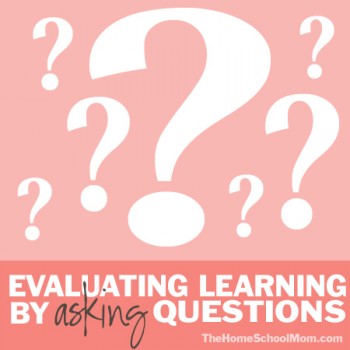
"You don't test your kids?" a teacher asked me when my children were very young. "How do you know what they've learned?"
I had to laugh. Homeschool testing wasn't necessary -- I was with them all the time, and all I had to do to find out what they were learning was to talk to them!
Talking Is the Evaluation
I explained to my teacher friend our process of homeschooling for mastery, the idea that the children should and will master the material they are working on. This may happen over time, after a child considers the subject from many angles and through multiple approaches. By asking the child questions and keeping up an ongoing dialogue, I am exquisitely aware of what the child is comprehending. I can keep introducing new resources to broaden understanding. I can involve the child in hands-on projects, field trips, artwork, writing exercises, and online research in order to help my child get more information so he can come closer to mastering the subject at an age-appropriate level.
When I talked to my sons about something they were learning, I often asked open-ended questions:
What do you think about that?
What does that remind you of?
Where have you read about something similar?
What conclusions are you drawing?
If my child could not give answers that demonstrated understanding, I knew that he did not yet have mastery of the material. If my child did not include basic factual content or vocabulary words related to what he was learning, I knew he was not yet fluent in the basic knowledge needed to explain the concepts. If my child could answer with basic facts, but he had difficulty expressing comparisons or connections, I knew we needed to work on analysis and synthesis.
Testing Is Actually the Shortcut
I realized over my years of homeschooling that testing is actually the shortcut, developed as a more efficient way to assess knowledge in many students at once, and frequently used to compare them to one another. Talking to kids, asking them questions, drawing them into dialogue is an authentic way to evaluate learning in much greater detail and "in real time."
This even works for skills-based learning, such as arithmetic or hand writing. Asking a child to write or do math with me or for me shows me right away whether he has mastered a new skill. I can immediately decide whether he needs more instruction, time to process, or another approach.
Using conversation and questions to understand what a child is learning is part of a dialogue-based approach to education, which is usually mentioned only in connection with adult education. However, it can be an important part of homeschooling children as well. I feel so strongly about it that I developed a conference presentation called Homeschool Tools: Dialogue, Facilitation, and Mentorship, explaining how parents can use questions to create an ongoing but relaxed learning and evaluation atmosphere in their homeschooling.
Thinking and Dialoguing Are Skill Builders
Children who are asked what they think--have to think! Furthermore, their thinking and dialogue skills transform over time into writing skills. Many approaches to homeschooling incorporate aspects of dialogue, but homeschooling parents often do not realize that this common element is a way of helping a child construct his understanding of the world -- thus often considered part of a constructivist pedagogy. At the same time, it can be a way of helping the parent peek into the child's world, to determine whether the child is getting the facts and comprehension he needs -- it's an evaluation!
Yes, for many children, maybe even most children in today's world, learning to take traditional tests is important. If they plan to take more traditional classes, attend a public or private school, or seek higher education, they will certainly need to be comfortable with regular ol' test-taking. However, most kids can pick up these skills quickly, leaving more homeschooling time for learning rather than testing, especially during the early years.
Despite not emphasizing testing when my children were young, my ongoing evaluation through asking questions and dialogue always gave me all the information I needed to know about my kids' progress. You may enjoy considering how you, too, already use dialogue in your homeschooling, and whether you can explore how asking questions in a natural and authentic manner can help you know what your children are learning.



 A popular speaker at homeschooling conferences, business groups, and parents’ groups, Jeanne Potts Faulconer homeschooled her three sons in North Carolina, Mississippi, and Virginia for twenty years. Holding her Master of Arts degree in Communication, Jeanne conducted portfolio evaluations for Virginia homeschoolers for evidence of progress for many years. Jeanne is a former college faculty member, former editor for several publications, news correspondent for WCVE, and former director of Brave Learner Home. She is the contributing editor for TheHomeSchoolMom newsletter and writes the popular Ask Jeanne column addressing homeschool parents' questions here at TheHomeSchoolMom.
A popular speaker at homeschooling conferences, business groups, and parents’ groups, Jeanne Potts Faulconer homeschooled her three sons in North Carolina, Mississippi, and Virginia for twenty years. Holding her Master of Arts degree in Communication, Jeanne conducted portfolio evaluations for Virginia homeschoolers for evidence of progress for many years. Jeanne is a former college faculty member, former editor for several publications, news correspondent for WCVE, and former director of Brave Learner Home. She is the contributing editor for TheHomeSchoolMom newsletter and writes the popular Ask Jeanne column addressing homeschool parents' questions here at TheHomeSchoolMom.
Thanks for this! This is what I have been doing but didn’t know anyone else did.
I'm glad this was an encouragement to you, Nkt.
This is my philosophy for testing! Thanks for putting in words what it is we do. Now I have a better response to that question, "How do you test your children?"